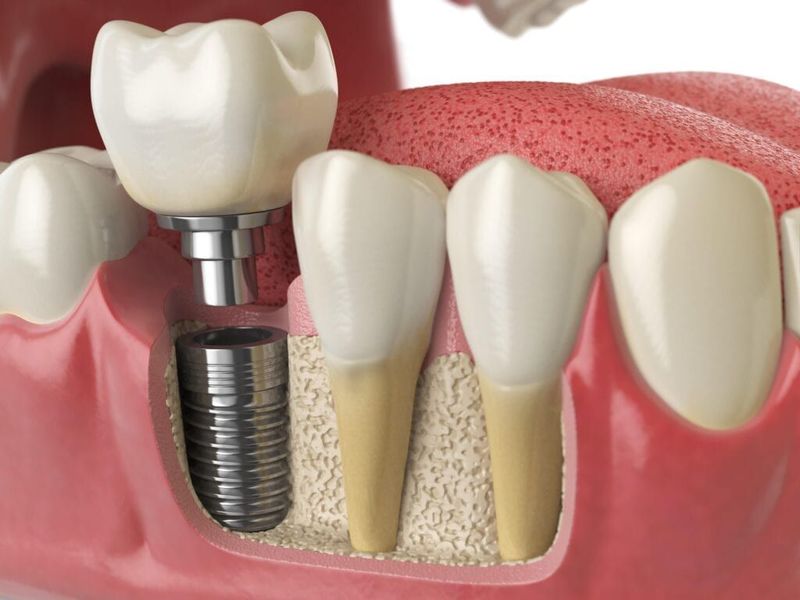

How Long Does Dental Implants Last on an Average?
Dental implants are a popular and effective long-term solution for replacing missing teeth. They are designed to look, feel, and function like natural teeth, providing patients with a durable and permanent solution. However, many people wonder how long dental implants actually last. In this article, we will explore the lifespan of dental implants and discuss factors that can affect their longevity.
Factors Affecting the Longevity of Dental Implants
Conclusion
In conclusion, dental implants are a long-lasting and reliable solution for replacing missing teeth. With proper care and maintenance, they can last a lifetime. Factors such as oral hygiene, overall health, implant placement, and lifestyle choices can influence the lifespan of dental implants. It is essential to work closely with a dental implant specialist and follow their guidance to ensure the best possible outcome. If you are considering dental implants, consult with a qualified professional to determine if you are a suitable candidate and to learn more about the benefits and potential risks associated with the procedure.
Key Takeaways: How Long Does Dental Implants Last?
– On average, dental implants can last between 15 to 25 years.
– Factors like oral hygiene, overall health, and habits like smoking can affect the lifespan of dental implants.
– Regular check-ups and professional cleanings are important to ensure the longevity of dental implants.
– Choosing a skilled and experienced dentist for the implant procedure can increase the chances of long-lasting results.
Frequently Asked Questions
How long do dental implants last?
Dental implants are designed to be a long-term solution for missing teeth. With proper care and maintenance, dental implants can last a lifetime. The success and longevity of dental implants depend on various factors, including oral hygiene, overall health, and lifestyle habits.
Regular dental check-ups and cleanings are essential to ensure the health of your dental implants. It is also important to follow your dentist’s instructions for oral hygiene, including brushing and flossing properly. Avoiding habits such as smoking and excessive alcohol consumption can also contribute to the longevity of your dental implants.
Are dental implants a permanent solution?
Dental implants are considered a permanent solution for missing teeth. Unlike dentures or bridges, which may need to be replaced or repaired over time, dental implants are designed to fuse with your jawbone and become a part of your natural dental structure.
However, it is important to note that while dental implants themselves are permanent, the crowns or prosthetic teeth attached to the implants may need to be replaced after a certain period. This is typically due to normal wear and tear or changes in the shape of the jawbone. Your dentist will be able to assess the condition of your dental implants and recommend any necessary repairs or replacements.
Can dental implants fail?
While dental implants have a high success rate, there is a small possibility of implant failure. Factors that can contribute to implant failure include poor oral hygiene, smoking, certain medical conditions, and inadequate bone density.
If a dental implant fails, it may need to be removed and replaced. Your dentist will assess the situation and determine the best course of action. It is important to follow your dentist’s instructions for oral hygiene and regular check-ups to minimize the risk of implant failure.
Can dental implants be replaced?
In some cases, dental implants may need to be replaced. This can occur if the implant fails, the prosthetic tooth becomes damaged, or if there are changes in the jawbone structure. Your dentist will assess the condition of your dental implants and determine if replacement is necessary.
The replacement process involves removing the existing implant and placing a new one in its place. This may require additional procedures such as bone grafting to ensure stability and proper integration with the jawbone. Your dentist will guide you through the replacement process and provide you with the necessary information and care instructions.
What can I do to make my dental implants last longer?
To ensure the longevity of your dental implants, it is important to practice good oral hygiene. This includes brushing and flossing regularly, using a soft-bristled toothbrush, and avoiding abrasive toothpaste.
Regular dental check-ups and cleanings are also crucial for maintaining the health of your dental implants. Your dentist will be able to monitor the condition of your implants and address any issues before they become more serious.
Avoiding habits such as smoking and excessive alcohol consumption can also contribute to the long-term success of your dental implants. These habits can negatively affect oral health and increase the risk of implant failure.
How long dental implants last ?
Final Thought: How Long Do Dental Implants Last?
Dental implants offer a durable, long-term solution for missing teeth, lasting 20 years or more with proper care. Made from high-quality materials like titanium, they mimic natural teeth’s strength and stability through osseointegration. Regular dental visits and good oral hygiene habits are key to maximizing their lifespan.
Call or Book appointment online
:Ace Dental Care Alpharetta office: 678-562-1555 - Book Now
Ace Dental Care Norcross office: 770-806-1255 - Book Now
Disclaimer
This blog post was generated by artificial intelligence. The content of this post may not be accurate or complete, and should not be relied upon as a substitute for professional advice. If you have any questions about the content of this post, please contact us.
We are constantly working to improve the accuracy and quality of our AI-generated content. However, there may still be errors or inaccuracies. We apologize for any inconvenience this may cause.





